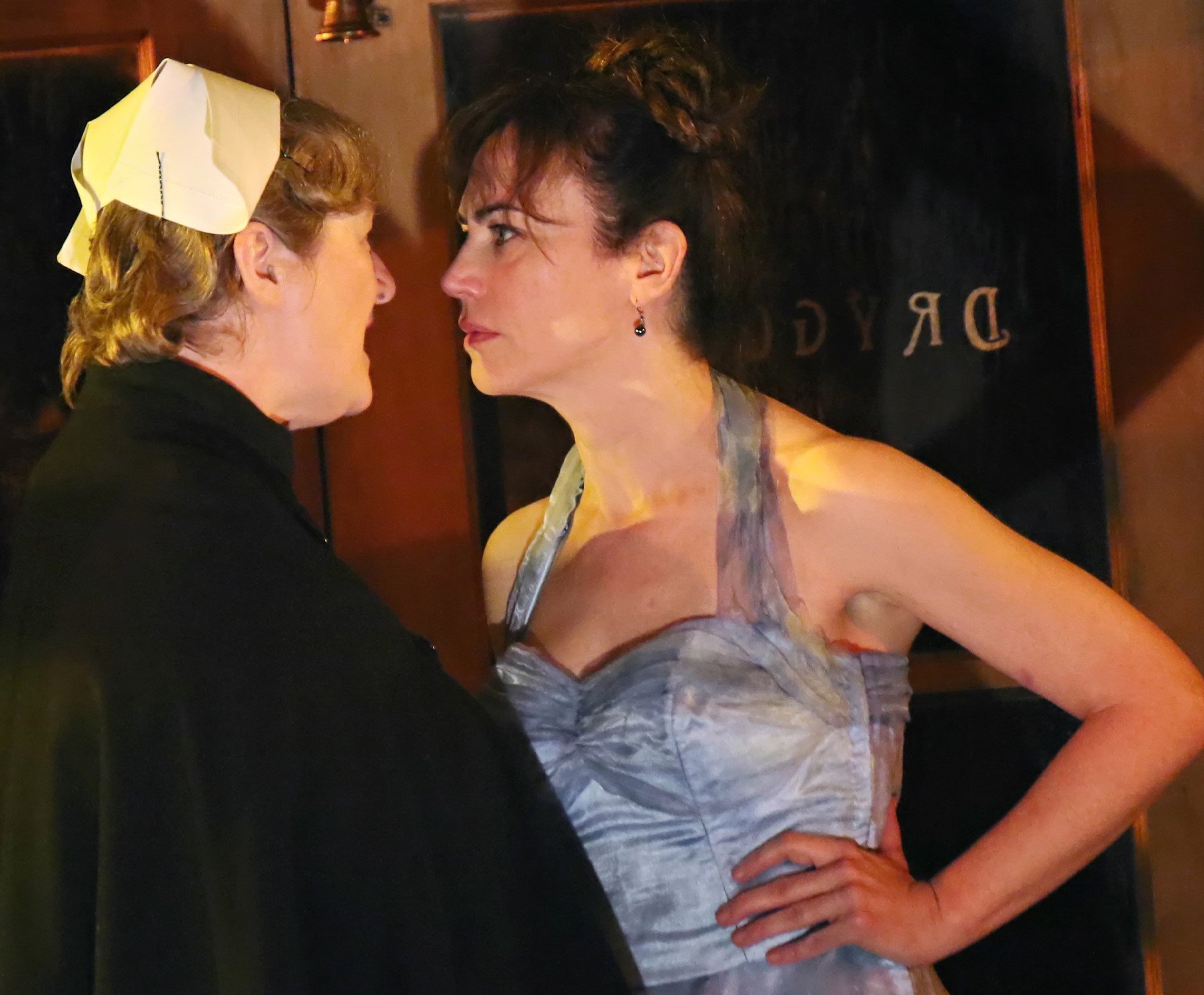Maggie Siff (left) plays Lady Torrance, and Pico Alexander is Valentine Xavier in Tennessee Williams’s Orpheus Descending.
Tennessee Williams’s Orpheus Descending is a play not frequently revived. Although it has many of the themes and elements of the major works, its premiere in 1957, directed by critic Harold Clurman rather than Elia Kazan, was short-lived. The production at Theatre for a New Audience throws into relief some of the problems. As interesting as the play may be for fans of Williams, one comes away with a sense of dissatisfaction. Williams described its theme as “more tolerance and respect for the wild and lyric impulses that the human heart feels and so often is forced to repress, in order to avoid social censure and worse.” Variety, however, judged it “a murky tale of inbred, hard-eyed people in a Mississippi village.”
Lady Torrance has a severe falling-out with her husband’s nurse (Fiana Tóibín).
Much of the murk derives from recycling elements from better plays. (Elia Kazan chided Williams for practically copying the same ending in Orpheus Descending as he used in Sweet Bird of Youth, which Kazan considered a far superior play.) There’s a figure in dire need of sexual awakening (like Maggie in Cat on a Hot Tin Roof), and there’s a stranger in town to upset the applecart (as in Bird). Here it’s Pico Alexander’s lanky hero—carrying a guitar rather than a lyre and attracting female interest.
First up is Carol Cutrere (a heavily mascaraed Julia McDermott), who flounces around town in a trench coat that’s open to reveal flimsy undergarments. Carol may have had a fling with Val in New Orleans some years earlier, but he doesn’t remember it, and he declares that he’s now 30 and done with all that. But it’s the attention of Lady Torrance, the wife of dying dry-goods merchant Jabe Torrance, that seals Val’s tragic fate.
Julia McDermott (left) is Carol Cutrere, and Dathan B. Williams is Uncle Pleasant, a conjure man. Photographs by Gerry Goodstein.
Siff’s Lady is of Italian descent (echoing The Rose Tattoo) and disdained by the locals. Her father was killed by the Klan for selling liquor to blacks when she was 18, at a time when, the town gossips say, “she was thrown over and her heart was broken by David Cutrere”—brother to the notorious Carol. Jabe moved in and married Lady, even though he was part of the Klan that burned her father to death along with his vineyard. And for 20 years Lady has been trapped in a loveless marriage.
Siff plays Lady as confident, composed and indifferent to gossip—though her Italian accent sometimes drifts toward Slavic. She has plans to reinvent her father’s vineyard in a confectionery adjacent to the dry-goods store (nicely evoked by David Weiner’s airborne orchard of round-shaded lights). Although Val manages to avoid Carol’s overtures, he accepts Lady’s invitation to sleep in a back room, since she doesn’t feel safe. “No monkey business with me!” Siff’s vulnerable, frustrated Lady warns him. Unfortunately, the dying Jabe is released from the hospital and returns home.
Through it all Williams slathers on symbols and mysticism. Val’s name inevitably connects to love (Valentine) and redemption (Xavier, i.e., Savior). The Old Testament comes into play as well. Val wears a snakeskin jacket—has he triumphed over evil by killing the Serpent and wearing its skin, or does his snakeskin jacket clothe the symbol of temptation? Or both, perhaps? What is clear is that his “Orpheus” has “descended” into a hellish society. The cat’s cradle of symbols includes a local conjure man (Dathan B. Williams), who pops up and gives “the Choctaw cry,” and Vee Talbott, the sheriff’s wife who has visions. “I was born with a caul,” she explains.
Val resists the temptation posed by Carol Cutrere.
The actors who have undertaken Val often pale next to the actress playing Lady (e.g., Kevin Anderson opposite Vanessa Redgrave in 1989 Broadway production). One of the drawbacks is that Val needs animal magnetism, but his abnegation of the wild life dampens any indication of it. Playing the object of desire who has forsworn meaningless sex, Val says to Carol that “a man’s weight on you would break you like a bundle of sticks,” yet one never glimpses the possibility that he’d be such a robust lover.
Under Erica Schmidt’s direction, Sheriff Talbott (Brian Keane) and his two cronies (Matt DeAngelis and Pee Wee Binnings) radiate a powerful menace. Williams’s portrait of the brutish men is truly scary. And Williams’s best poetry occasionally comes through: there is a speech about a bird that never lands until it dies that does work. Orpheus Descending may not be great Williams, but the story and characters are fascinating enough to pay it a visit.
The Theatre for a New Audience production of Orpheus Descending runs through Aug. 6 at Polonsky Shakespeare Center (262 Ashland Place, Brooklyn). Evening performances are 7:30 p.m. Tuesday through Sunday; matinees are at 2 p.m. Saturday and Sunday. For tickets and more information, visit tfana.org.
Playwright: Tennessee Williams
Director: Erica Schmidt
Sets: Amy Rubin
Lighting: David Weiner
Costumes: Jennifer Moeller
Sound and Music: Justin Ellington






